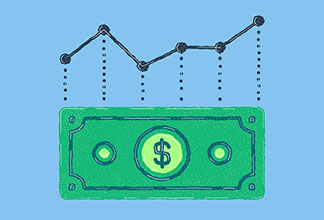RRSP FAQs: Your Questions Answered
Published on December 17, 2020
minute read
Share:
What is an RRSP?
A Registered Retirement Savings Plan (RRSP) is a personal savings plan registered with the federal government. It is designed to help Canadians save for retirement while deferring taxes until they need to use the funds.
Who can open an RRSP?
You can open an RRSP at any age, up to the end of the year you reach age 71, with a valid Social Insurance Number. You must be a Canadian resident for tax purposes, file an income tax return in Canada and have earned income to contribute to an RRSP.
What are the benefits of an RRSP?
The main benefit is that you can save for retirement now, while deferring taxes on income and capital gains earned within your RRSP until retirement (when you may be in a lower tax bracket). Read more about RRSP key benefits in Understanding RRSPs.
How can I determine my annual RRSP contribution limit?
The Government of Canada sets the annual contribution limit. Your maximum allowable RRSP contribution for the current year is 18 per cent of your previous year's earned income, up to the government maximum for the tax year, minus your previous year's pension adjustment. Any unused deduction room at the end of the preceding year is also carried forward for your use in the year. You can contribute to your RRSP any time in the current year or in the first 60 days of the following year.
You can check your specific contribution limit at any time by visiting My Account for Individuals on the Canada Revenue Agency (CRA) website.
What happens if I over-contribute to my RRSP?
If you over-contribute to your RRSP by more than $2,000, there is a 1 per cent per month penalty for each month that the excess amount remains in the RRSP.
Are there any benefits to consolidating my retirement savings?
Consolidating your assets (including those in your RRSP) can help you see your complete financial picture. This can make it easier to achieve your desired asset allocation because you aren't managing several portfolios and accounts. It can also help you to minimize fees and statements for different accounts.
How do my savings grow in an RRSP?
You can build your RRSP with different types of qualified investments: stocks, bonds, options, mutual funds, exchange-traded funds (ETFs), treasury bills and guaranteed investment certificates (GICs). The investment growth is tax-deferred until you withdraw the funds as retirement income.
What if I withdraw from my RRSP before retirement?
There are tax implications when you withdraw money from an RRSP before retiring, such as:
- Withholding tax at source on the money withdrawn (immediate loss of savings)
- Income tax owing in the tax year that you withdraw the money
- Losing your contribution room (you don't get it back like a TFSA)
- Losing future retirement income (based on the money withdrawn)
It's always good practice to check in with your tax advisor on your options.
What is a Group RRSP?
These are employer-sponsored retirement savings plans designed to encourage employees to save through payroll deductions. Employers usually match the employee contribution. The employee chooses and manages the investments in their RRSP and selects their retirement income plan when they retire.
What is a spousal RRSP?
A spousal RRSP names your spouse as the "annuitant" or owner of the RRSP, even though you make the contributions. The retirement income then shifts to the annuitant, or the spouse earning a lower income, and you and your spouse receive two income streams in retirement. The tax savings on receiving an RRSP contribution deduction go up as a taxpayer's marginal tax rate increases. Therefore, the higher-income spouse making a contribution to a spousal RRSP can create more tax savings to the family.
What happens to my RRSP when I turn 71?
At the end of the year you turn 71, you must do one of the following:
- Withdraw the funds from your RRSP; or
- Transfer the funds directly into a plan that provides income — for example, a Registered Retirement Income Fund (RRIF); and/or
- Use the funds to purchase an annuity (not available at RBC Direct Investing) – that can provide you with regular income to draw on during retirement.
Where can I learn more about RRSPs?
Read RRSPs Explained: A Primer for Investors, What Investments Can I Hold in My RRSP? (with video), or visit the CRA website at www.canada.ca. You can also explore the Investing Academy.
The information provided in this article is for general purposes only and does not constitute personal financial or tax advice. Please consult with your own professional advisor to discuss your specific financial and tax needs.
RBC Direct Investing Inc. and Royal Bank of Canada are separate corporate entities which are affiliated. RBC Direct Investing Inc. is a wholly owned subsidiary of Royal Bank of Canada and is a Member of the Canadian Investment Regulatory Organization and the Canadian Investor Protection Fund. Royal Bank of Canada and certain of its issuers are related to RBC Direct Investing Inc. RBC Direct Investing Inc. does not provide investment advice or recommendations regarding the purchase or sale of any securities. Investors are responsible for their own investment decisions. RBC Direct Investing is a business name used by RBC Direct Investing Inc. ® / ™ Trademark(s) of Royal Bank of Canada. RBC and Royal Bank are registered trademarks of Royal Bank of Canada. Used under licence.
© Royal Bank of Canada 2025.
Any information, opinions or views provided in this document, including hyperlinks to the RBC Direct Investing Inc. website or the websites of its affiliates or third parties, are for your general information only, and are not intended to provide legal, investment, financial, accounting, tax or other professional advice. While information presented is believed to be factual and current, its accuracy is not guaranteed and it should not be regarded as a complete analysis of the subjects discussed. All expressions of opinion reflect the judgment of the author(s) as of the date of publication and are subject to change. No endorsement of any third parties or their advice, opinions, information, products or services is expressly given or implied by RBC Direct Investing Inc. or its affiliates. You should consult with your advisor before taking any action based upon the information contained in this document.
Furthermore, the products, services and securities referred to in this publication are only available in Canada and other jurisdictions where they may be legally offered for sale. Information available on the RBC Direct Investing website is intended for access by residents of Canada only, and should not be accessed from any jurisdiction outside Canada.
Inspired Investor brings you personal stories, timely information and expert insights to empower your investment decisions. Visit About Us to find out more.










